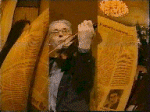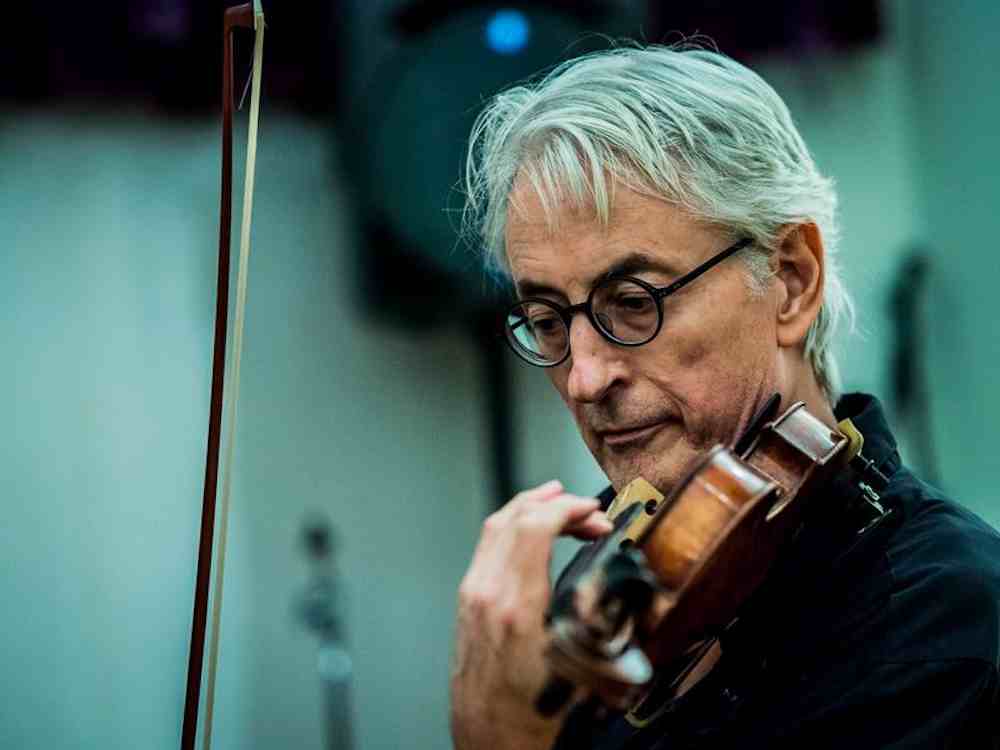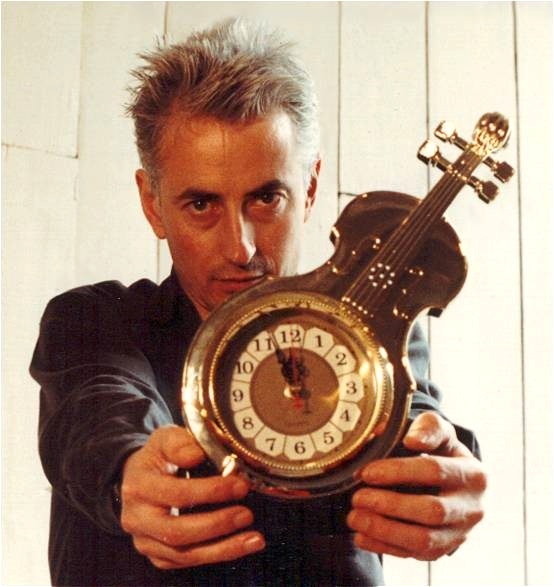Press Quotes 1975-1985
Jon Rose
what others say

This page consists of descriptive reviews from from The Sydney Morning Herald, Sonics Magazine, The Australian, Coda magazine, Cadence, The Australian Jazz Magazine, The Metro, Jazz Down Under, and many more.
'An incredible display of sonic and instrumental virtuosity, using all the 'illegal' sounds of the violin as material - this music is rewarding.'
Start Magazine, UK
'The event and the unfolding creation makes for a strong image which is as enjoyable as the music which, in rhythm and texture, has the richness of an orchestra.'
The Sunday Times
'Absolutely riveting ideas and emotional 'inscapes' were presented, explored, and discarded at a devastating rate - content this night was full and ripe.'
The Jazz Magazine, Australia
'The sudden realisation that there is order in this strange mass of sound is a powerful and stunning experience.'
Sonics Magazine, USA
'His stamina is a local legend; he has been known to play for up to 12 hours without a break.'
Sydney Morning Herald
'The instrument itself is the theme of the improvisations, signified with a perpetual nervous technique, continual transformation, and excessive energy.'
Art Press, France
'He is visible and vulnerable, and you will never come closer to the creative performance than this.'
Jazz Down Under
'I have seen Jon Rose playing with a huge saucepan over his head, with which he creates a resonating chamber for his voice and violin.'
Encore Magazine, Australia
'He started his concert by building a collage of sounds on a homemade instrument that defies description, before moving onto violin for a richly imaginative outpouring of thoughts.'
Coda Magazine
'Using a couple of bows on bits of instruments and gadgets wired together and with his bare feet controlling pedals, Mr. Rose produced some excruciating noises in a series of improvisations - I for one was not impressed.'
Adelaide Advertiser
'If any recently released Australian recording deserves the accolade of 'courageous/outrageous' in concept, it is certainly this one. 'Tango' merits repeated listening but will hopefully inspire other musicians to come forward with revolutionary creations of their own.'
What Magazine
'Rose is greatly expanding the violin vocabulary from a decidedly avant stance. He is particularly facile and inventive player, very much involved with quick movements all over his axe, intersecting and cross-cutting lines with and without bow.'
Cadence Magazine
'Jon Rose's violin playing clearly derives from the challenge offered to traditional acoustic instruments and the standard techniques by the advent of electronic music. His 'straight' bowing and fingering is impeccable. He has also mastered a range of sounds that can be coaxed from the standard instrument by alternative means.'
Sydney Morning Herald
'Jon Rose is an outlandish Monty Pythonesque musician who will entertain worth a unique collection of instruments and a rare improvisational talent. A kaleidoscope of the bizarre.'
Sydney Morning Herald
'Rose starts playing dissonant variations on his melody. It's a nice, zany piece. Rose's absurd juxtapositions of the straight and the noisy is paradigmatic of his playing throughout - he knows lots of songs - too many - and during his abstract musings he quotes from them compulsively.'
Cadence Magazine
'Don't be put off by the 'avant-guarde' tag and miss the last performance of The Relative Band's tour tonight - each show is a rousing experience, marked by humour and inventiveness, unearthly chords and unbelievable riffs.'
The Metro, Sydney
'The sound he gets from the violin is a constantly urgent substance of great variety. Webern-in-a-terrible-hurry aspect is the more serious extreme of a music which also includes intrusions of split-second-country-music-sawings at the other. So there is humour too, and Webern is fortunately too late for the Duchess' tea party, in spite of the rush.'
Coda Magazine
'The performance space is blackened. The piece is advertised as an 'improvisation'. Jon Rose enters with a musical device, a viola held at the shoulder with a long shaft extending to the floor. The end of the shaft is attached to a set of small wheels. His body is wired, cassette recorder strapped to his side, also a number of sound modifiers. He looks like he is prospecting with a metal detector.'
NMA magazine, Australia
'The Relative Band developed a distinct 'multi-cultural' flavour and an ability to (dare I say it) entertain, as opposed to 'play at' the audience. The overall feeling was that this group wanted to play together in a big band and they did just that.'
The Australian Jazz Magazine
'A captivating sense of humour pervades the whole, as fragments of standards, of entire tunes, are interwoven with improvisations - it is immensely approachable and enjoyable. The doubting Thomases in the jazz fraternity should hear the chillingly soulful reading of 'Round Midnite'.'
The Australian Jazz Magazine
'The principal aural and visual element of creative comment was provided by musician Jon Rose. As a sort of swagman-violinist, he injected some humour into the proceedings with a variety of wittily improvised sounds. The scraping of a violin bow across polystyrene patches fixed to his elbows was a typical example of his ingenuity. Mr. Rose's party piece was the total destruction of an old upright piano. At least, the reason for there being only two performances was made clear. Not many sacrificial pianos are available. The ritual produced in me a feeling similar to that which animal liberationists must feel at witnessing the dismembering of an anaesthetised horse. The ultimate musical disembowelling took place physically beneath a performance of Berio's 'Sequenza 3', sung by Tricia Martin, perched on top of the piano's case. I offer no critical comment on this aspect of the evening.'
The Canberra Times
'Jon Rose contradicts any concept that I have previously held about the condition of Australian art. This recording illustrates clearly a very positive and original path.'
Coda Magazine
'A hilarious version of the standard tune 'Misty' initiated by Jon Rose, provided moments of outrageous humour.'
The Australian
'Last night's concert triumphantly affirmed that, given players of wit, imagination and technique, improvised music at its best has a primeval freedom that draws us back to the unfetted origins of musical expression. The largest and arguably most developed piece last night occurred at the end of the concert, running for over 30 minutes, and involving all seven performers in a complex web of patterning that boiled up to a tremendous climax, with frenetic sax and cello barking out counterpoint against the berserk machinations of percussion and drums.'
The Advertiser, Australia
'Simultaneously Jon Rose and the group provided a palette of perpetually varied sound colours, pursuing their different paths, then coming together, playing off one another, the ostinato passages relentless and moods, frenetic explosions of sound that ended with the tale of a joyous animal party, in which Nicols impersonated a squirrel and squawked like a parrot.'
The Sydney Morning Herald
'The excellent ears of these musicians lead them to co-author some amazingly intricate interludes, some unheard-of-sonorities and some sparkling repartee with total spontaneity.'
Sydney Morning Herald
'This most recent incarnation of The Relative Band is the most ambitious, yet most successful offering of free improvisation I've had the pleasure of witnessing in this country. Adequate superlatives escape me. This is how I've always wanted improvised music to be; dynamic, surprising, cosmopolitan, and most of all - fun.'
The Australian Jazz Magazine
'He aims to transmit the improvised conception itself. He works out his ideas in the same dimension as the sound and indicates it simultaneously.'
Actual Magazine, Japan
'There's a lot in these improvisations, the violin's a rich instrument and he has plenty of uses for it- the whole past of the instrument is subsumed in the moment of playing.'
Musics Magazine UK
'Jon Rose's contribution is an intrinsic part of the performance. He provides more than background noises, his music is an expression of language. Most importantly, he enters the act to break points in the duologue which could become monotonous and is capable of flashes of a spontaneous sense of humour when things go wrong. Though whether the incident I'm thinking of was planned or had gone wrong is hard to distinguish.'
The Canberra Times













